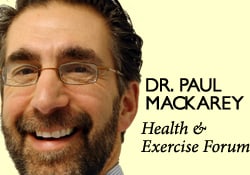
Part 2 of 2

November is National Chronic Obstructive Pulmonary Disease (COPD) month. COPD is the fourth leading cause of death in the United States, according to the Centers for Disease Control and Prevention. This problem refers to a group of lung diseases that causes damage to the airways and air sacs in the lungs. People with COPD suffer from diminished airflow and difficulty breathing. Emphysema and chronic bronchitis are two of the most common types of COPD. The damage can't be reversed, so treatment includes medications and lifestyle changes designed to control symptoms and minimize further damage, according to the Mayo Clinic.
Exercise is an important part of life for those with COPD because it improves the overall strength and endurance of respiratory muscles. When you exercise, muscles adapt and use oxygen more efficiently so your lungs don't have to work so hard. Also, in addition to improvement in breathing, exercise boosts mental health, helps maintain a healthy weight and blood pressure, and improves circulation. Most importantly, exercise will improve your quality of life with COPD.
Before you begin an exercise program, see your family physician or pulmonologist for approval. Then, see a physical therapist to design a program specific for your needs. Always begin slowly and rest if you get short of breath, have chest pain, feel dizzy or sick to your stomach.
While not all of these endurance exercises may be appropriate for you, one or two of these may offer a good starting point.
A. Walk Around the House: Start walking around the house for 1-2 minutes nonstop. Every 1-2 hours. Then, add 1-2 minutes every week.
B. Static Marching: hold onto the countertop or back of chair and march in place for 30 seconds. Rest 1-2 minutes and repeat. Do 5 cycles. Add 5-10 seconds every week.
C. Climb the Steps: If you can do so safely, use the steps for exercise 1-2 times per day. Then, add 1-2 times per day.
D. Walk the Mall/Treadmill: If you are able to get out of the house and can tolerate more extensive endurance exercises, get out and walk the malls or use a treadmill.
E. Recumbent Bike: If balance is a problem, but you can tolerate more extensive endurance exercise, use a recumbent bike (a bike with a backrest)
Walking is free exercise and can be done in some form by almost everyone…even with an assistive device such as a cane or walker. For those with COPD who are active and fit – walk 4-5 days per week for 30 to 45 minutes. Less fit individuals can walk for 15 to 20 minutes. For those with COPD who are in poor condition and have significant SOB – walk for 2-3 minutes (to the bathroom or around the house) every 30 to 45 minutes. Try not to sit for 60 minutes without getting up and walking around.
Posture exercises are designed to keep your body more upright and prevent rounded shoulders and forward head/neck. More erect posture promotes better breathing.
A. Row-The-Boat - Pinch shoulder blades together as if you are rowing a boat.
B. I-Don’t-Know – Shrug shoulders up toward the ears as you do when you say “I don’t know.”
C. Chin Tucks – Bring your head back over your shoulders and tuck your chin in
A. Bicep Curls – sit in chair and bend your elbows up and down with a can of peas in your hands
B. Wrist Curls – as above but bend your wrists up and down
C. Chair Push-ups – Push up with your arms to get out of a chair
D. Saw Wood – pull a light resistance band (yellow) back from a door knob as if you were sawing wood.
A. Hip Hikes – Sit in chair and march by hiking your hip and lifting up your heel 4-6 inches off the floor
B. Leg Kicks – Sit in chair and kick your knee out straight – then bend it down to the floor
C. Hips Out and In – Sit in chair and bring your knees in and out against a resistance band
D. Toe Raise/Heel Raise – Sit in chair and raise your toes up – then raise your heels up
A. Diaphragmatic Breathing - The diaphragm muscle is essential for breathing. While sitting or lying down, put one hand on your abdomen and the other on your chest. Slowly inhale through your nose and try to separate the hand your stomach from the hand on your chest. Then, slowly exhale through pursed lips.
B. Pursed Lipped Breathing - breathe in through your nose slowly for 3- 5 seconds. Then, purse your lips as though you're going to whistle. Lastly, exhale slowing through the pursed lips over 5 to 10 seconds.
More Information: “Better Breathers Club,” in conjunction with the American Lung Association, offers a free local support group to help patients and their families suffering from COPD and chronic lung disease. www.lung.org
Visit your doctor regularly and listen to your body.
Keep moving, eat healthy foods, and exercise regularly
NEXT MONDAY – Read Dr. Paul J. Mackarey “Health & Exercise Forum!”
This article is not intended as a substitute for medical treatment. If you have questions related to your medical condition, please contact your family physician. For further inquires related to this topic email: drpmackarey@msn.com
Paul J. Mackarey PT, DHSc, OCS is a Doctor in Health Sciences specializing in orthopaedic and sports physical therapy. Dr. Mackarey is in private practice in downtown Scranton, PA and is an associate professor of clinical medicine at GCSOM.